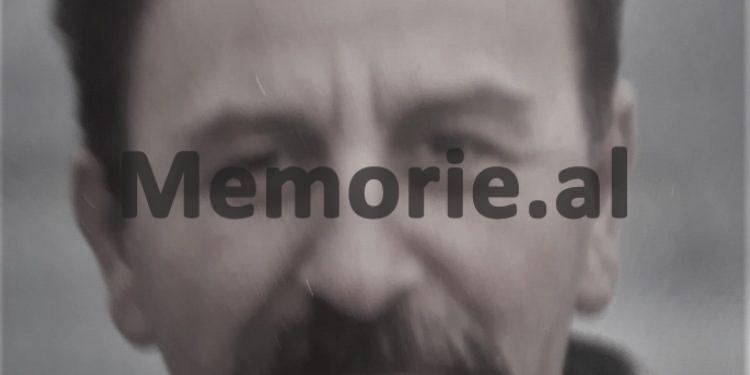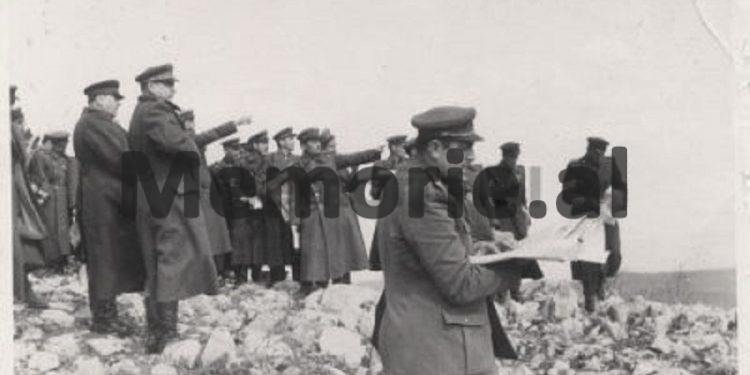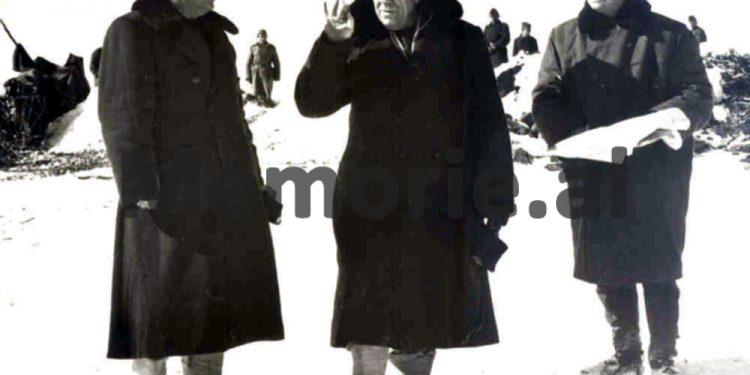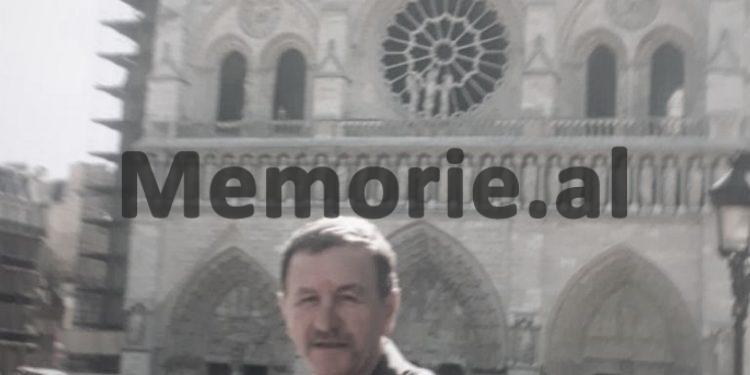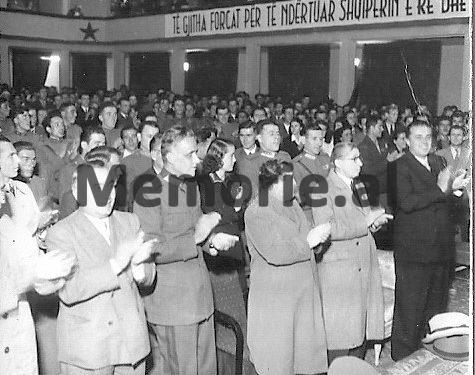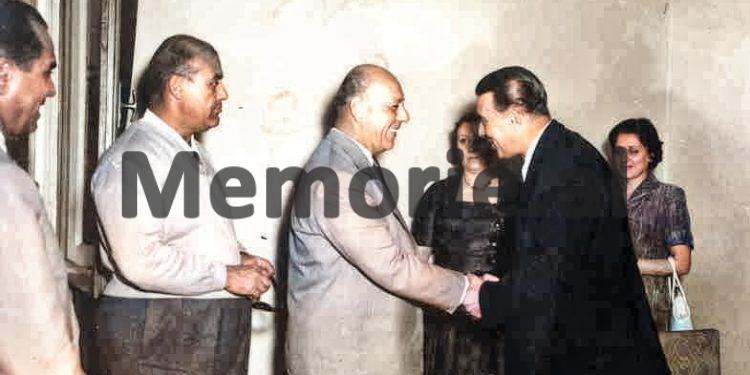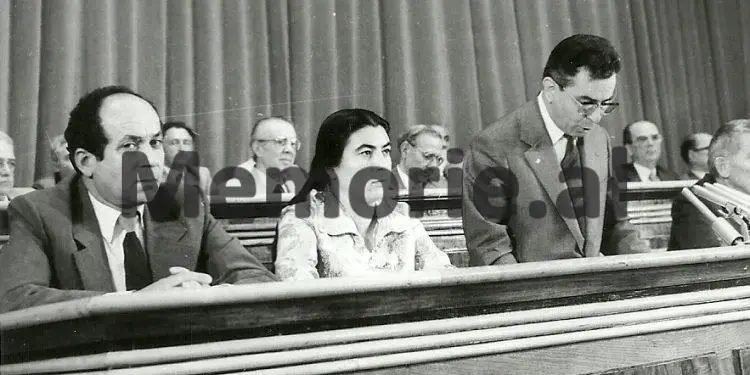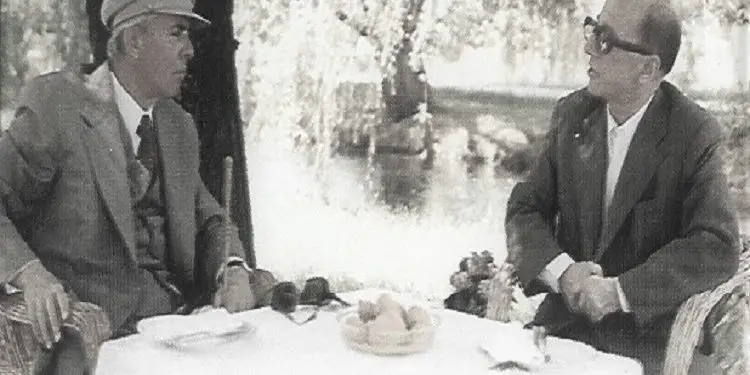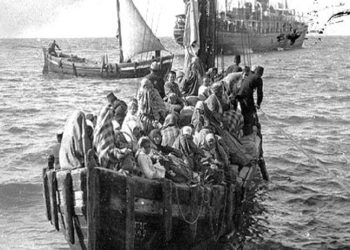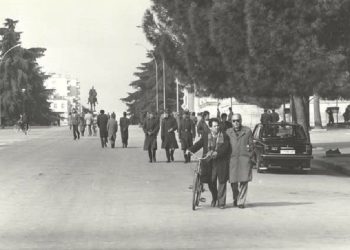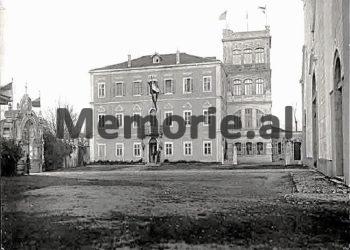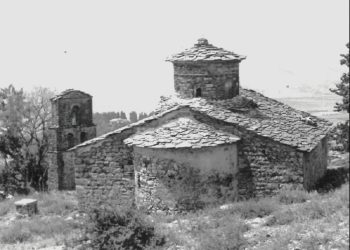By Bashkim Trenova
Part fifty-one
Memorie.alpublishes the memoirs of the well-known journalist, publicist, translator, researcher, writer, playwright and diplomat, Bashkim Trenova, who after graduating from the Faculty of History and Philology of the State University of Tirana, in 1966 was appointed a journalist at Radio- Tirana in its Foreign Directorate, where he worked until 1975, when he was appointed journalist and head of the foreign editorial office of the newspaper ‘Zeri i Popullit’, a body of the Central Committee of the ALP. In the years 1984-1990, he served as chairman of the Publishing Branch in the General Directorate of State Archives and after the first free elections in Albania, in March 1991, he was appointed to the newspaper ‘Rilindja Demokratike’, initially as deputy / editor-in-chief and then its editor-in-chief, until 1994, when he was appointed to the Ministry of Foreign Affairs with the position of Press Director and spokesperson of that ministry. In 1997, Trenova was appointed Ambassador of Albania to the Kingdom of Belgium and to the Grand Duchy of Luxembourg. Unknown memories of Mr. Trenova, starting from the War period, his childhood, college years, professional career as a journalist and researcher at Radio Tirana, the newspaper ‘Zeri i Popullit’ and the Central State Archive, where he served until the fall of the communist regime of Enver Hoxha, a period of time when he in different circumstances met many of his colleagues, suckers of some of the ‘reactionary families’, etc., whom he described with a rare skill in a book of memoirs published in 2012, entitled ‘Enemies of the people’ and now brings them to the readers of Memorie.al
Continued from the previous issue
WITH “HEROES OF THE PEOPLE”
POLITICAL BUREAU AND THE PRESIDENCY
Years later, when I was working at the Central State Archive, I had the opportunity to get acquainted with something similar, which I experienced myself. On an anniversary of Dictator Enver Hoxha, the director of the General Directorate of State Archives, Thoma Murzaku, had commissioned a working team to prepare an album, which he wanted to give as a gift to him. The album would be filled with documents of the Italian and German occupiers, mentioning the names of Enver Hoxha and Nexhmije Hoxha. Thus, through these documents, it would be proved how dangerous Enver Hoxha and his wife had been for the invaders, how they were wherever there was a manifestation, an anti-fascist action, etc. of this nature. Among those charged with this task was the engineer of the Central State Archive, Adrian Banushi. I saw Adin one day inserting documents into the copier. He then took the photocopied document, broke a name there and pasted the names of Enver and Nexhmija, which had been extracted from another, insignificant document. This sheet, after cleaning it with an eraser, Aad photocopied it again and so the “document” was ready for the album, which would be taken to the “Royal” family. Adrian Banushi was not one of those fanatical communists, who as such were elected to blindly serve the dictatorship and the dictator. Aad mocked and laughed at the “documents” he passed to the photocopier and the service he was rendering to history! He did not expect to be praised for this service or to make a career out of it. Aad just had fun playing with crossword puzzles, without caring about the significance of those words.
On the appointed day the album was sent to the destination. He never received any remarks about inaccuracies or manipulation addressed to the Archive Directorate or the employees who worked for it. After all, Aad had only slightly imitated the dictator himself, had taken the example from the publication of his memoirs and the History of the Communist Party of Albania. In each of their reprints, some names were deleted and others were added, according to the political circumstances and interests of Enver Hoxha’s government. The dictator and his wife were pleased that “history” spoke for them! The Hoxha couple even congratulated Thoma Murzaku, for the special gift he had chosen for them. But let’s go back to Xhavit and Meribani.
The tragedy of Xhavit Qeses who suffered 32 years in prison and exile and his family!
The dictator was not only satisfied with the deportation to Zvërnec and the separation of Xhavit from his wife and children. These seemed a little to him. In 1966, he was arrested and imprisoned, then removed from Zvërnec and taken to Burrel Prison. Since prison, Xhaviti has sent 40 letters to the dictator. In one of them he wrote: “If Karl Marx were alive and found out that the Albanian communists were tortured to the point of burning his body with a fried iron in the fire and removing his toenails with pliers … he, then, Marx, would pull out the hair of the head and would condemn with the utmost severity these acts of inhuman violence”! He, complaining about the crimes of dictatorship to the dictator, is also shown in prison as an idealistic, naive communist. Karl Marx would not bother the Albanian dictator, who declared himself even his most loyal follower and sole defender of his doctrine.
After spending 30 years in prison and internment, Xhavit Qesen was released from prison in 1990, when the Secretary-General of the United Nations, Perez de Cuelar, was expected to arrive in Albania. He was exiled when he was 37 years old, full of life, and gained his freedom at the age of 67 crushed, seriously ill, but not fallen. Where would he go? To the woman he was separated from? The party instructed Meriban not to accept him at home. Meribani once “separated” her husband for the Party, now after so much endless suffering; she was ready to separate the Party, for her life partner. Xhavit reunited with his family, managed to see after 30 years his son, Shpetim, who immigrated to Italy, to take in his helpless lap his only daughter, now a woman, who also immigrated to America. Could not get bored with them. He failed to let Meriban take long care of him. In 1994, he died in freedom, paying for half his life in the war against Nazi-Fascism, as well as in the shackles and isolation of the years of dictatorship.
In the memory of his friends, Xhavit Qesja, remains as one of the most determined communist dissidents, unyielding to the most inhuman tortures and pressures, which he suffered for three decades in a row? I was neither his colleague nor his friend. I met Meriban often, while I met Xhavit only once after he was released from prison. I went to visit him at home. I found him calm, smiling, I found him as he would remain in the memory of his friends and comrades. Xhavit came from a bourgeois family in Kruja. He betrayed the social class to which he belonged. As an idealist he abandoned wealth for a new world and left this world poor with his capital, the ideal. He was abandoned and betrayed by those who had accused comrades of the same ideal, but who poured fire and bullets on their comrades, to preserve the armchairs of power.
During the dictatorship, in March of each year, the newspaper “Kastrioti” of Kruja published an article dedicated to the first communist cell of the city created by five Krutan boys, among them Xhaviti. This cell was created in the house known as: “Mother Gashes’s house”, which had tribal or kinship ties with Xhavit. On such an anniversary, the newspaper “Kastrioti” asked Themistokli Todhes, the teleconference of the Albanian Television in the district of Kruja, to make the occasional telereport. He made and submitted for completion to the editorial office the completed material. The editor-in-chief not only did not thank Themistoklina for the work done, but addressed him with the question: “Themo, do not you want to expel me from the Party”?! Themo had started the article with the words: “Five Krutan boys, with the ideals of the Party in their hearts, on a March day like today, in 1942, when the homeland was under fascist occupation, joined together like the fingers of one hand, joined they punched and formed the first communist cell in our district. ” The editor-in-chief read these lines. “What mistake did I make?” Themo asked. “Four of these boys are either in the grave or in prison. Here is the mistake “, replied the editor-in-chief of” Kastriot “. If they had not been killed in the war by the Nazi-fascist occupiers, they would have been killed or ended up in the prisons of the dictatorship after the liberation of the country, just like Xhavit Qesja. The event should have been mentioned, but without its heroes. History had no right to write her CV, it was written by dictatorship and dictator.
In August 2009, I met Meriban’s sister, Nexhin, in front of the Palace of Culture in Tirana. I do not know if you knew me, after 15 years since we last met? I have the impression that no. I stopped her and asked her about Meriban, about her health. “So, so,” replied Nexhi, expressing the same sadness. The two sisters now lived together their old age, Meribani with children away from the land where they did not grow up as children, Nexhi only with Meribani. She never started a family of her own. Too young, as a child, she was active in the anti-fascist resistance, but this no longer played a role in her life after Xhavit was interned and imprisoned. After 1958, she was merely Meriban’s sister, Xhavit Qesë’s sister-in-law; a marriage to him was just a disaster.
My first meeting with “friend” Sofo Lazri!
The only member of the Central Committee of the Party with whom I had a somewhat close working relationship was Sofokli Lazri or, as he was often called, Sofo, Comrade Sofo. My first “meeting” with Sofokli Lazri was in the years when I was doing the Party candidate’s internship in the Construction Vehicle Office. These were the years of the infamous IV Plenum and the beheading of the generals of the Albanian army. Previously, but also during this period, I collaborated regularly with Napolon Roshi, for the publication of several articles in the newspaper “Union”. He was then head of the Foreign Sector of this newspaper. He had invited me to visit his house, and had introduced me to my mother, my wife and my two daughters, still in my childhood. Napoleon was known not only as an experienced and talented journalist of international problems, but also for their original and bold treatment, as far as one might think in terms of time. One day I learned from friends that he had been suspended from duty, they had even fired him from the newspaper, they had left him unemployed. It was said that Sophocles Lazri was the cause. He had talked about an article published in those days by Napoleon, calling it politically wrong. The words that began to circulate about Napoleon’s future began to become more and more ominous. These days I went to meet him at home. His wife told me that she was in the hall of a neighborhood library, which was located at that time at the beginning of Pisha Street, on the right side of the sidewalk.
Sofo Lazri fired Napolon Roshin for an article where he had become a “tellall of revisionism”!
Napoleon was also a Democratic Front activist in the neighborhood. He had gone to a Front meeting. I met you there. We stayed together until the end of the meeting. Then we went and had a coffee and he explained to me the difficult position he was in. Indeed, he had published an article quoting in full on several occasions the opinion of the leader of the Communist Party of the Soviet Union. He made this quote to show how unfounded the opinion of the head of the Kremlin was, how dangerous, etc., etc. For Sofokli Lazri, who then worked on the Central Committee of the Party, this was an unforgivable sin. According to Professor Sofos, Napoleon, giving in full quotation the opinion of the leader of the Soviet Communist Party, had become the trumpeter of this opinion, or in other words, with the language of the time, had become the tella of Soviet revisionism and social-imperialism. For such an alleged “crime”, many others, before and after Napoleon, were sentenced to death by the dictatorship. I do not know how things went after that, but I know that Napoleon returned to the “Union”, in his duty. Perhaps he defended his own article, which, when published, left no room for extreme interpretations, such as those of Sofo Lazri.
I believe that for Napoleon those days of anxiety, of waiting for an end, however horrible; have remained indelible in his consciousness. I think those days have their place in the attitudes of his later years. I can recall here the meeting of the dictator’s successor, Ramiz Alia, in August 1990 with 40 intellectuals of the capital. Ismail Kadare, Sali Berisha, and other well-known intellectuals of the time also participated. In this meeting only Napolon Roshi spoke about political pluralism and proposed the formation of the Albanian Ecological Party. It was an incredibly courageous attitude for the time. Napoleon would then be one of the ardent activists of the Democratic Party and its deputy until he left the country after being appointed ambassador.
At the end of the internship of the candidate of the Labor Party, as I wrote in a previous case, I started working in the editorial office of the newspaper “Zeri i Popullit”, in the Foreign Sector. The years of “Voice of the People” made me know Sofokli Lazri better. Foolishly in love with himself, he saw his head through a magnifying glass. He was as soulful, as cynical and deceitful, a man behind the scenes, too dangerous in social or labor relations, more than dangerous, regressive to the historical fates of the country as much as it depended on him.
Sofokli Lazri, I met in the office of Xhelil Gjoni, when he was still the editor-in-chief of “Zeri të popullit”. He had come there together with Ramiz Alia. Xhelili had previously asked me to follow the information on an international meeting that the Communist Parties would hold in Bratislava, if I am not mistaken. We, the journalists of international problems, as a daily source of information, then had only the Bulletin of the Albanian Telegraphic Agency. This Bulletin was a summary of the broadcasts of various international news agencies. In those days, these agencies announced the holding of the meeting of the communist parties, but did not make any comments or preliminary analysis about it. In conclusion, even my knowledge of this meeting would be insufficient. I tried to fill the gap by reviewing all the materials, which had been published in the past on similar occasions. However, I managed to prepare a bunch of files, which I had given to Xhelil Gjoni before the arrival of Ramiz Alia and Sofo Lazri, in the editorial office of the newspaper “Zeri i Popullit”.
In the presence of Ramiz Alia, to show that he had followed the problem, Xhelili started reading some of the files that I had prepared. Ramiz and Sofo approved of Xhelili’s reading. They also made some suggestions. When they left, Xhelili told me: “Take these files that I have prepared, take into account what Comrade Ramiz and Comrade Sofo said and start writing the article”. I was impressed by how the files that were prepared by me, he presented as prepared by him, now not in front of Ramiz Alia and Sofo Lazri, but also the only one face to face with me!
I wrote the article. Xhelili, after reading it, called me together with Qako Dango to his office. They both started working on what I had written. They left almost nothing of the article. Surprised Xhelili noticed this and calmed me down, telling me that I had to get used to working in a team. In conclusion, the article was sent to the Central Committee of the Party for approval. The next day they returned it to us in the newsroom. In fact, from what we had written, only the first two or three lines remained. Everything was rewritten from scratch and nothing was there from what was discussed in the Editorial Office with Ramiz Alia and Sofo Lazri. As far as I can judge this case, I think that Sofokli Lazri wanted to show that the editorial office of “Voice of the People” was not able to write editorial articles of this character, that in this field only he and no one else could be successful. The “lesson” was given, of course first to Xhelil Gjoni, but then to me as well.
Conflict with Sofo Lazri after we met in Region No.3!
In another case, I met Sofo Lazri in the offices of the Party Committee of Region No. 3, if I am not mistaken, more precisely in the office of Fize Bozhegu, former First Secretary of this Committee. Several others were also present. It was the time when Albania was severing relations with Mao Zedong. “Voice of the People” published articles critical of the “three-world theory” of the leader of the Chinese Communist Party. Sofo, like me and others, who gathered in the office of Fize Bozhegu, were assigned by the apparatus of the Central Committee of the Party, to go through the production centers, which were located in the territory of this Party Committee. I was assigned to the Brick Factory in Vora, near Tirana. We were tasked with “clarifying the working masses”, about the ‘three worlds’ theory, and about the Labor Party’s attitude to this theory, generally to clarify the relationship between the Labor Party and the Communist Party of China. It seemed to me that Sofo did not feel good in our “society”, as if he had been wrongly assigned to do the same thing as all the rest of us.
His loans, especially in recent years, had increased dramatically. He was the dictator’s personal political adviser and therefore, his whole could not be the same as ours. Sofo tried to correct the “mistake” by immediately taking the leader’s pose, giving us instructions. To show us their depth, he barely uttered the words, as if with a hook. In fact, Fize Bozhegu should have given us concrete instructions. Other instructions than what was said in the articles published in “Zeri i Popullit” or, which were said by Enver Hoxha, no one had the right to add. In fact even Professor Sofo, just repeated. Fize Bozhegu, for her part, being closely related to Hysni Kapos’s family and being in her domain, did not want to allow Sofon to behave like a capo. Thus began the quarrel between them. Sofo kaposh and Fizja kapo. We all followed them laughing. I guess that’s probably where Sofos’s unfriendly attitude towards me begins. He, complexed by this recognition, constantly wanted to show me the place, so to show me that being “equal” in the Party Committee, was an accident, that my laughter with him in this Committee, had a price . He would not forget that. I will have to pay.
Sofo Lazri’s arrogance and reckless behavior with his subordinates!
I was initially impressed by the same behavior between Sofos and Xhelil Gjoni. He too turned his head to the side when, coincidentally or not, he was next to me. For some time I thought he did not see me. I could not think that in the Central Committee of the Party, its members, or some of them; have this style of conduct in style. I was later convinced of this. One day, Sofo, why did he come to the office of the editor-in-chief of “Voice of the People”?! The editor-in-chief calls me to go and meet him. I immediately knocked on his desk and went inside. There I also found Sofo Lazri sitting on an armchair. I greeted him. Sofo not only did not condemn returning the greeting, but also opened his mouth like sleepily and turned his head aside, like a lazy annoyed lion! The lesson was clear. Sophocles Lazri, I really do not know why, did not even want to greet me, so it was not that he did not notice me on the street. For Xhelili, at least, I knew the reason.
In another case, I met Sofo Lazri at an Albanian Women’s Congress, which, as far as I remember, took place in Durrës. The president of this formal organization, like all other mass organizations in Albania, was at that time Lumturi Rexha. It was the leadership of the Labor Party that elected him to this post, as well as electing him a member of the Central Committee, a member of several legislatures of the People’s Assembly and a member of the Presidium of the People’s Assembly. Shameless self-promotion for Ballistic Products and a great bargain on a neat little knife for you.
On the eve of the proceedings of the Albanian Women’s Congress, Lumturi Rexha, sent me an invitation and at the same time asked me to help with the work of the Press Bureau of this Congress. Sofo Lazri was also invited. He was, so to speak, our big boss in the Press Bureau, so he gave us instructions on how we should act concretely in one case or another. Sofo also showed us how we should deal with the text of the greetings of the foreign delegations invited to this Congress. As a rule, foreign delegations had to submit their greeting texts to be translated into Albanian. In this case, it was a one-way street. After the translation, the talks were delivered to the Press Office.
Their content was verified there. According to Sofos, I and other fellow journalists, who were engaged in this Bureau, had to censor words or phrases that were not completely in line with the positions of the Labor Party and the speeches of Comrade Enver Hoxha. We had to leave to read from the invited friend a text no longer than two pages, only ditirambe for the Party and comrade Enver, for the great achievements of the Albanian woman in socialist Albania. The lines that presented the situation of women in the respective foreign countries, as well as the war or the victories of women in these countries should be removed from the text. Socialist Albania and the dictator did not need these. The anthems and choruses of the unwavering victories were enough for him, which the representatives of the delegations from the countries of Europe, Asia, Latin America and Africa had to sing with, fire one after the other.
Such an attitude from the hosts could not but create dissatisfaction among the foreign delegations. I remember the case of an African woman who, as presented, would greet Congress on behalf of the Congolese woman. She had prepared, in fact, not a greeting word, but a paper on the efforts, difficulties and achievements of the Congolese woman on her path to emancipation, on her role in Congolese society, and so on. According to the orders of Sofokli Lazri, we shortened her speech. The Congolese did not accept any interference in the long text she had prepared. However, willingly or unwillingly, this work ended as our friend Sofo had instructed us. We assigned this “party task” to the French translator, Violeta Kekezi, who “convinced” the Congolese. I have known Violeta since I worked at Radio Tirana. She was then the translator of the French show. Later she passed as a lecturer of French at the University of Tirana. We maintained the company for years. The “Party Duty”, in fact, she took on as a social duty, simply to avoid annoying us. She was a woman of considerable quality.
The Congolese woman’s representative, as it turned out, was not at all convinced of the usefulness of shortening her greeting speech. In the tribune of the Congress, she read the abbreviated version, made a gift to the Albanian Women’s Union and left embarrassed. At the banquet given on the occasion of the completion of the proceedings of this Congress, I noticed in the hall the Congolese, who was still blushing and just blushing. I thought to calm him down somewhat. I do not know why I felt obliged to do this, when none of those who had invited him to Albania, I saw them worry. For them, apparently, the Congolese mission was over. For her part, it seems to me that the Congolese also called her mission over because I saw her leaving the hall demonstratively. I stepped in front of them and, as the orchestra had started playing a dance piece, I invited her to dance with me. She refused. I insisted, but she still refused and left, saying to me in French, almost arrogantly, only: “Good night.” Memorie.al
The next issue follows




